Claudia Shulzhenko. Voice era
Claudia Ivanovna Shulzhenko was born on March 24 1906 of the year (exactly 110 years ago) in Kharkov. At that time, no one could have thought that this girl would become a pop singer famous throughout the country, and in 1971, the people’s actress of the USSR. Klavdiya Ivanovna was born in the family of an accountant of the Railway Department of Ivan Ivanovich Shulzhenko and his wife Vera Alexandrovna Shulzhenko. It is worth noting that the girl’s father was not an ordinary Kharkov accountant, he was a true connoisseur of songs and romances. In his free time, he sang in an amateur choir and played in a brass band. They say that when Ivan Shulzhenko began to sing, the listeners were pulling in from the whole street, and from the neighboring streets too. So the love of music and singing was transmitted to the girl from her father.
My father wanted his daughter to become a singer. And little Claudia Shulzhenko was crazy about Vera Kholodnaya and other actors of silent films, believing that everyone would be able to sing, but only a few could become a good actor. Anyway, all the native girls supported her hobbies and inspired her creative career. In Kharkov, there was the Ukrainian Drama Theater, in which famous director Nikolay Sinelnikov worked in those years. By 15 years, Claudia revised the entire repertoire of the theater and vowed to herself that she would become an actress.
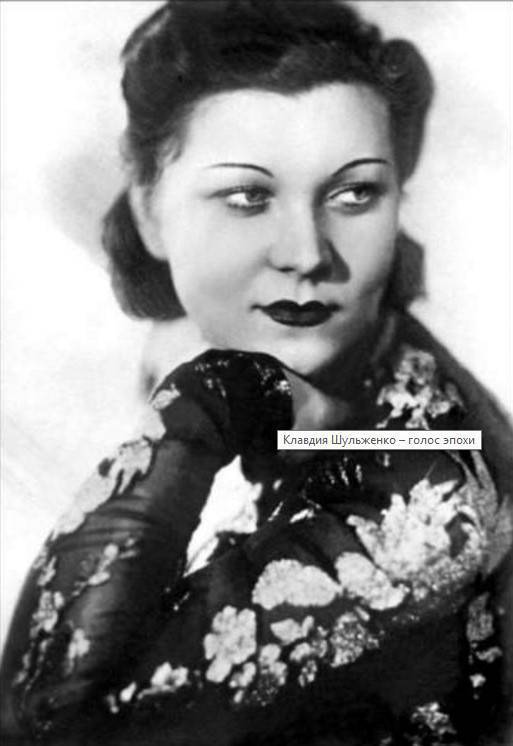
As a result, in 16, a girl, whose creative potential was supported by relatives and friends, decided on a very brave step. In 1923, she came to the Kharkiv Drama Theater and cheerfully invited the director to take her to work in the troupe. To the question of Nikolay Sinelnikov, slightly discouraged by this approach, about what she can do, Klavdiya Shulzhenko replied decisively: “Sing, dance and recite!” A chubby little girl with pigtails “basket” dressed in her mother’s elegant dress charmed the famous director. He asked the well-known in the future, and for the time being the beginning composer Isaac Dunaevsky, who was in charge of the musical part of the theater, to play along with her. The musical talent of the girl, her childlike spontaneity, and the talent already seen, were liked by the director, and he took her to the theater troupe. Getting into the troupe of director Sinelnikov was considered in those years a very big success for a novice actor. At that time, the Kharkov theater and its team were considered the best on the periphery.
A few years before 1928, Claudia Shulzhenko worked under the direct supervision of Nikolay Sinelnikov. On his recommendation, she entered the Kharkov Conservatory for the vocal course, which was led by Professor Chemizov. Thanks to participation in performances of the native theater and persistent studies at the Conservatory, Klavdiya was recognized by the Kharkov public. Although the famous actress Claudia Ivanovna never became, in the theater she played mostly in the crowd scene and sang in the choir, work in the drama theater was not in vain for her. Claudia's acting abilities were most clearly manifested later on the stage, where she managed almost all of the acting arsenal, which she acquired on the stage: comedy characters, lyrics, ability to dance.
For Klavdiya Shulzhenko, Kharkov became not just a city of childhood and youth, but also the birth of serious love. In 1928, the same age, Vladimir Koralli from Odessa, came to this city on tour. In the middle of the 20-ies of the last century, he went on tour with the variety theater, beat tap dance, led concerts as entertainers, performed satirical and funny couplets. The first meeting was fleeting, in the same year the singer went to Leningrad. It was in the city on the Neva that their second meeting took place, which marked the beginning of their future family and creative union. Claudia Shulzhenko married Vladimir Koralli in 1930, in May 1932, their son was born - Igor.
It is worth noting that the true recognition and love of the public came to Shulzhenko in Leningrad, where she left Kharkov in 1928, and to which she then gave half of her life. As a singer in the spring of 1928, she was invited to perform at a concert, which was timed to the Day of the Press, the performance took place on the stage of the Mariinsky Theater. Literally in one evening she became famous. For the encore, the singer was called at that concert three times, showered and offers to perform. In 1929, she becomes a soloist of the Leningrad variety art and performs at the Moscow Music Hall. One after another there are records with her records, which differ by thousands. In those years in the USSR it was difficult to find a house in which the songs performed by her would not sound: “Chelita”, “Grenada”, “Memorandum”, “Harness, boys, horses!”, “Uncle Vanya”, “From edge to edges ”,“ Portrait ”and many others.
In 1934, Shulzhenko managed to play in the film “Who is your friend?” Directed by M. A. Averbakh as Vera. In 1936, her first gramophone records appeared. In the fall of 1939, the first All-Union Variety Artists Contest was held. The extremely strict and authoritative jury of the competition did not award the first prize to anyone, although there were quite talented artists among the competing speakers. At the same time, three songs - “Chelita”, “Note” and “Girl, Goodbye”, which were presented by Claudia Shulzhenko, made a very strong impression on the audience and the jury, allowing her to become the winner of the competition. After its completion, its popularity has only grown. There were more and more records with her records, and for a long time they did not linger on the store shelves.
In January, a jazz orchestra conducted by spouses Vladimir Koralli and Klavdiya Shulzhenko, which was quite popular and existed until the summer of 1940, was formed in Leningrad in 1945. From the first day of the Great Patriotic War, this group turns into a front-line jazz ensemble, with which Klavdiya Shulzhenko speaks to the soldiers of the Leningrad front, sometimes right on the front line. The announcement of the beginning of the war caught the singer on tour in Yerevan, from where she voluntarily decides to go to the front. Hundreds of times Shulzhenko traveled to the front, where she spoke to the Red Army soldiers, her songs were played both in front positions and in hospitals in the rear. At the end of 1941, the song “The Blue Handkerchief” that has become in the future appears in its repertoire; the music for which was written by the Polish composer Jerzy Peterburgsky. There were many different variations of the lyrics of this song. Claudia Shulzhenko performed the text of Yakov Galitsky in the editorship of Mikhail Maximov.
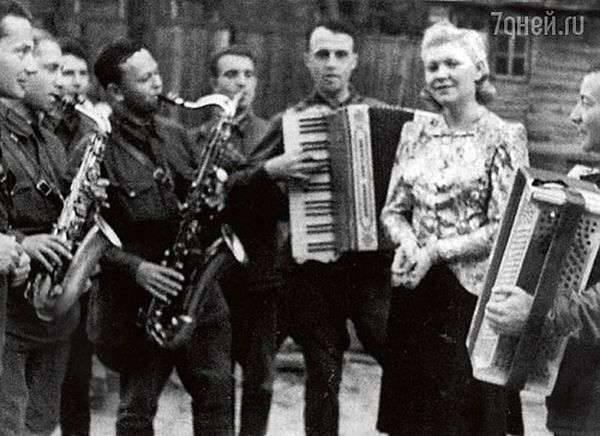
12 July 1942 of the year on the stage of the Leningrad House of the Red Army passed the 500 concert of Shulzhenko and the Front Jazz Ensemble, later in the same year the singer was awarded the medal "For the Defense of Leningrad", and 9 of May 1945 of the year - the Order of the Red Star. In the summer of 1945, for outstanding achievements in the field of vocal art, Claudia Ivanovna was awarded the title of Honored Artist of the RSFSR. Then the Soviet press wrote that the final creative credo of the singer, her lyrical heroine and artistic theme were formed precisely during the Great Patriotic War, since her repertoire no longer had “random” songs. However, her songs were still different, but the artist has learned to make them truly hers. During the siege of Leningrad, she gave more than 500 concerts for soldiers and officers. And thanks to her performance, front-line songs such as “Let's smoke”, “Blue handkerchief”, “Friend-fellow soldiers” received the all-union recognition and love of the listeners.
During the war years, Kronstadt forts, front-line dugouts, hospital wards, an airfield field, a forest edge, and wooden sheds often became its stage. However, in any conditions, she tried to appear at the concert in a dress and high-heeled shoes. Once she had to speak directly from the back of a truck with the sides folded down, climbing onto this impromptu scene, she broke her heel. After that, she gave a concert, standing on tiptoe. During the performance, German aviation made a raid, anti-aircraft artillery began to work, and bombs began to burst nearby. The singer was literally pushed down, someone pressed her overcoat to the ground. When the air raid ended, Claudia Shulzhenko again went up on stage, shook off her outfit and finished the concert, but without shoes. And this is just one small episode from Shulzhenko’s military biography, and she held a huge number of such concerts during the war years. The soldiers answered her for this gratitude: they wrote her numerous letters, gave flowers, kept records and photographs.
At the end of 1940-ies Shulzhenko still remains a fantastically popular and sought-after singer, the circulation of records, which would have been her songs, is estimated in millions of copies. In fact, Shulzhenko’s voice becomes a real symbol of the era, the sound embodiment of the Great Patriotic War. Very often it was used in feature films and documentaries in order to mark the time frame of what is happening. However, attempts to play in the cinema basically did not lead to anything, losing contact with the audience, Claudia Ivanovna was lost herself.
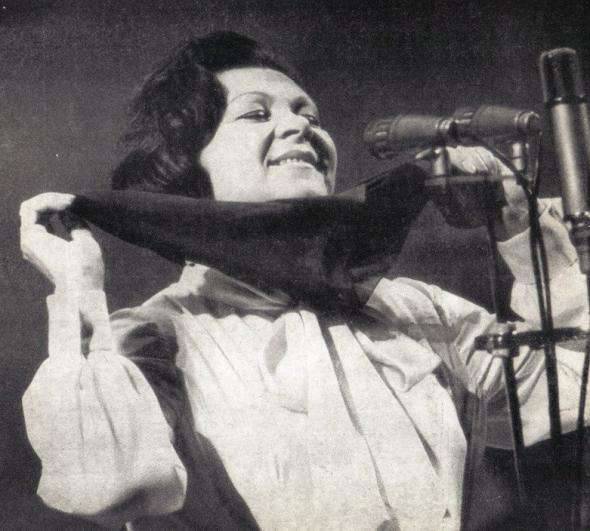
At some point, she even began to deteriorate relations with the authorities. At the turn of 1940-1950-ies, she was accused of petty-bourgeois and tried to impose her repertoire on her. However, she didn’t play the pathos songs of the Soviet years. Shulzhenko sang about love, not about the party and the Komsomol, perhaps that is why she received the title of People's Artist of the USSR relatively late, in 1971, at the sunset of her pop career. True or myth, but there is information that Claudia Ivanovna even quarreled with Stalin. She refused to perform at the 31 concert in December 1952 of the year, which was attended by the leader. On the eve of December, 30, they called her and said that she would perform in the Kremlin, to which the singer replied that they had warned her too late, she had already managed to draw up her own plans for that day. “According to the constitution, I also have the right to rest!” Said Shulzhenko. If so story indeed, it happened, the imminent death of Joseph Stalin left her without any special consequences for the singer's creative activity.
In 1956, Shulzhenko divorced Coralli. In July of the same year, director Marianna Semenova introduced her to the famous cameraman Georgy Kuzmich Epifanov, who was in love with the singer since 1940 of the year. Epifanov fell in love with her even before the outbreak of the war, when he accidentally acquired her record with the song Chelita. And after a few months, when he got to her concert in Leningrad, he realized that he had completely “disappeared”. Georgy Epifanov was in love with Claudius Shulzhenko in absentia for many long 16 years and remained faithful to this love for the rest of his life. All these years, the singer has received many letters from fans, many have confessed her love, but in this mass of letters and greeting cards she always singled out those signed by the initials of G. Ye. The mysterious admirer, who was George Epifanov, sent her cards all corners of a vast country. In this case, the cameraman was younger than the Soviet pop star on 12 years. It would seem that if two people love each other, what could be a barrier to their happiness? However, this is nowadays not so strictly looking at the difference in the age of two lovers, and in those years they condemned such a union, whispered behind their backs: "The devil contacted the baby." However, the love of two people turned out to be much stronger than prejudices and judgments. Together they lived up to the 1964 year, then they separated, but after a long time, in the 1976 year, they converged again and did not part.
In the postwar years, Claudia Shulzhenko literally reigned on the Soviet stage, any songs performed by her over time became popular. She gave dozens of solo performances per month, and each new day brought her hundreds of fans. Over the years, her skill sharpened more and more. The last time Klavdiya Ivanovna appeared on the big stage of the Column Hall of the House of Unions in 1976 year. At the concert, according to numerous requests from the audience, she performed all her songs of the war years. Moreover, the last LP of Claudia Shulzhenko “Portrait” was released in 1980, four years before her death, and in 1981, her memoirs saw the light of the year.
Claudia Shulzhenko's heart stopped beating more than 30 years ago, she died 17 June 1984. She was buried in Moscow at the Novodevichy Cemetery. According to eyewitnesses, it was cloudy that day in the capital, it was raining, but directly at the funeral the sun came out of the clouds. The younger generation knows about it only in passing. But the main thing is that in the distant and very difficult years of the war, her voice raised Soviet soldiers to the attack, facilitated the recovery of the wounded and instilled in people the confidence that victory would come.
26 May 1996 was opened in Kharkov city museum of Claudia Ivanovna Shulzhenko, which presents concert costumes, personal belongings, documents and other relics that belonged to the singer. And by the centenary of the performer, the Saratov jazz orchestra “Retro” prepared a program from authentic scores of ensembles and orchestras performed by a famous singer. So many years later, in the 2006 year, under the arches of the Column Hall in the Kremlin, her songs sounded again.
Claudia Ivanovna Shulzhenko was and remains a real national treasure, classics and the standard of Soviet art. It would seem that she did not have such a strong voice and such an attractive appearance, but it was her “Let's smoke” and “Blue Scarf” who became and remained forever smash-hits. It is not by chance that, without exaggeration, they say about her: “Soviet Edith Piaf”.
Based on materials from open sources
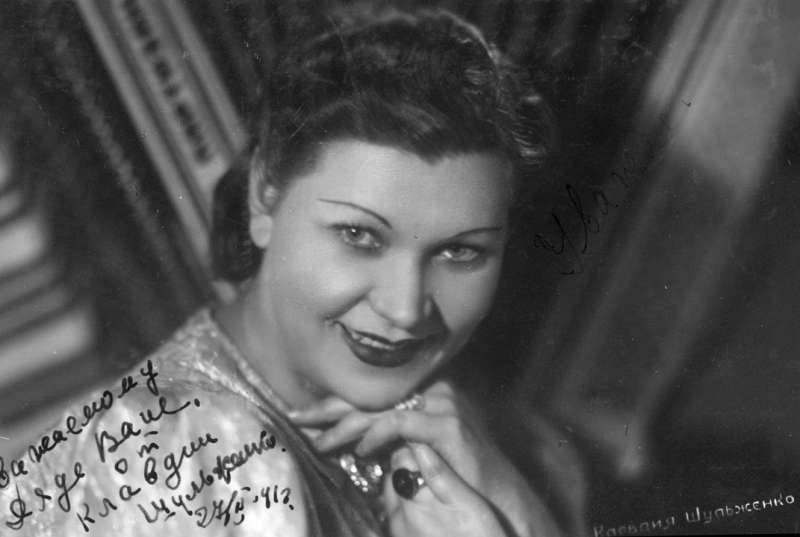
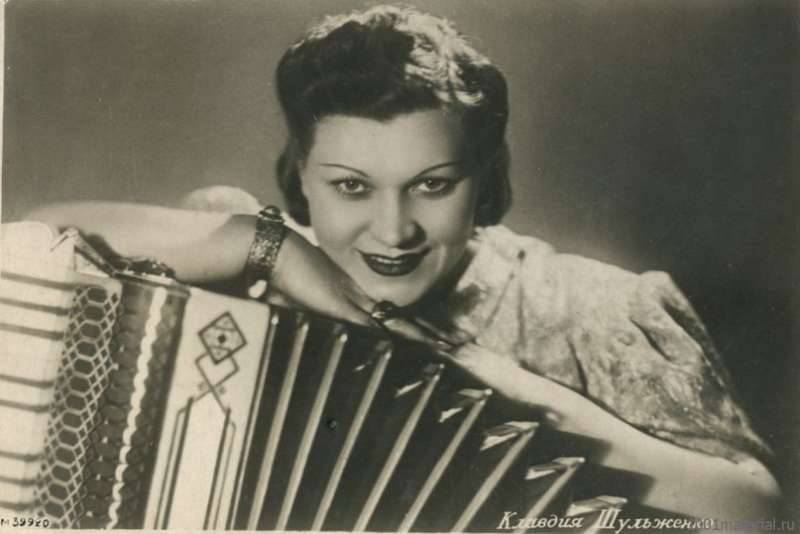
Information